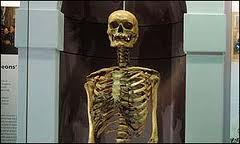GIDEON’S STRUMPET
Soft Skull Press, 2003
Heredity actually is a dirty book, thank god. Jenny Davidson has written a story that appeals to our lesser angels, and entertains from its first to its last page. Elizabeth Mann, considering murder or suicide, needs to escape New York. In the first of many coincidences she receives a call from an old friend, who edits guide books. Their London researcher has come down with a case of hepatitis. Does she want the job? Elizabeth boards the plane to London, where more coincidences follow. Perhaps they are resonances, as nearly everything that happens in this book happens more than once.
One of her first stops is the Royal College of Surgeons. Elizabeth’s father is a famous gynecologist, an infertility specialist, and she is obsessed with medicine and the body in general. At the college there is a full skeleton on display of the notorious thief catcher and organized crime figure of 18th century London, Jonathan Wild. (Jonathan Wild’s exploits and execution spawned a whole literature from pamphlets to pieces by Defoe and Fielding). Later she runs into Gideon, a former student and colleague of her father’s whom she last saw when she was 15. On page 11 they have graphic, wet sex in his office. On page 14 they do so again. Ah, the rules. Thank god the rules are broken; thank god for dirty books by smart people.
Gideon and Elizabeth go to an auction where Gideon loses out on a blind bid on what he hopes is a lot of antique medical equipment to his despised father-in-law. What he gets instead is a box with a moldy old manuscript that doesn’t interest him at all, but it does Elizabeth, because it is the unpublished memoir of Jonathan Wild’s second wife, Mary. Wild’s first wife, with whom he has a child, happens to be named Elizabeth Mann. As she reads the manuscript she becomes obsessed with Jonathan Wild and decides nhe wants to have his baby. Gideon agrees to attempt to clone Wild from the skeleton and implant the embryo in Elizabeth.
The plot knocks about between the two stories. Elizabeth finds herself in sticky situations with other men, with Gideon’s wife and his senile mother. Elizabeth is a matter-of-fact narrator. She drinks a lot, cuts herself with razors and screws Gideon just about everywhere. It is all decadent fun, but it is also a novel about fathers and sons, father’s and daughters, husbands, wives and lovers. It is a novel about paternity and adultery in the end.
Davidson’s book is a lot of fun to read. I’m not sure that it’s consequential, or that it’s supposed to be. She is a professor of 18th century English literature and culture and has written academic books. Fortunately this doesn’t ruin her prose style or her sense of fun. It does infuse the narrative with wit and intelligence, to balance out the low life lust and alcoholic vomiting. If her research shows a bit in the Wild narrative, so what? The Wild portions race along anyway, with, sadly, only hints here and there of 18th century prose.
In a bit I’ve read quoted by an interviewer Elizabeth describes to Miranda (Gideon’s wife) the kind of novel she wants to write:
‘“It’s about organized crime, really. Gangs of thieves fencing stolen goods. Charismatic gang-leaders. Random acts of violence.â€
Miranda’s taken aback. ‘A kind of mystery novel?’ she suggests.
‘Well, detective fiction,’ I say. ‘You know. Noir. Raymond Chandler. Chester Himes. Derek Raymond. Robbe-Grillet and the French new novel. No psychology. Lots of brutal sex and violence. Man reduced to sheer environment.’â€
The reviewer, or interviewer, thought this was an apt description of Heredity. I disagree. Elizabeth has a past. She argues with herself and with Gideon about what that past means for her present. Decisions are seen as the consequence of childhood experience, of unnameable emotions, repressed desires and unconscious drives. There’s actually an argument about psychology running in the narrative. There are suggestions of Freudian psychoanalytic concepts, contrasted with a hard-wired psychology based on heredity. It’s not insistent; like everything else in this book it’s just there for the picking. And the sex is mostly brutal in the 18th century. The brutality in the present is not sexual, it’s social, and familial. Well, there’s plenty of Freud in that. But I will have to find out who Derek Raymond is.
The book takes a serious turn towards the end. It made me reconsider what went before, but it did not spoil the fun, it perhaps deepened the shadows. And this serious turn is mirrored in the Wild narrative.
Davidson has written two books for young adults. I would like to read these too, but I hope she writes more adult novels. There’s no money in it, no, but she’s too good to deprive us of stories like Heredity.




